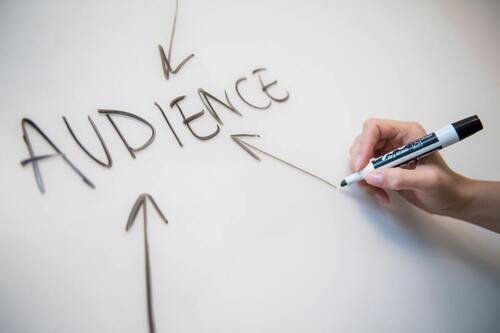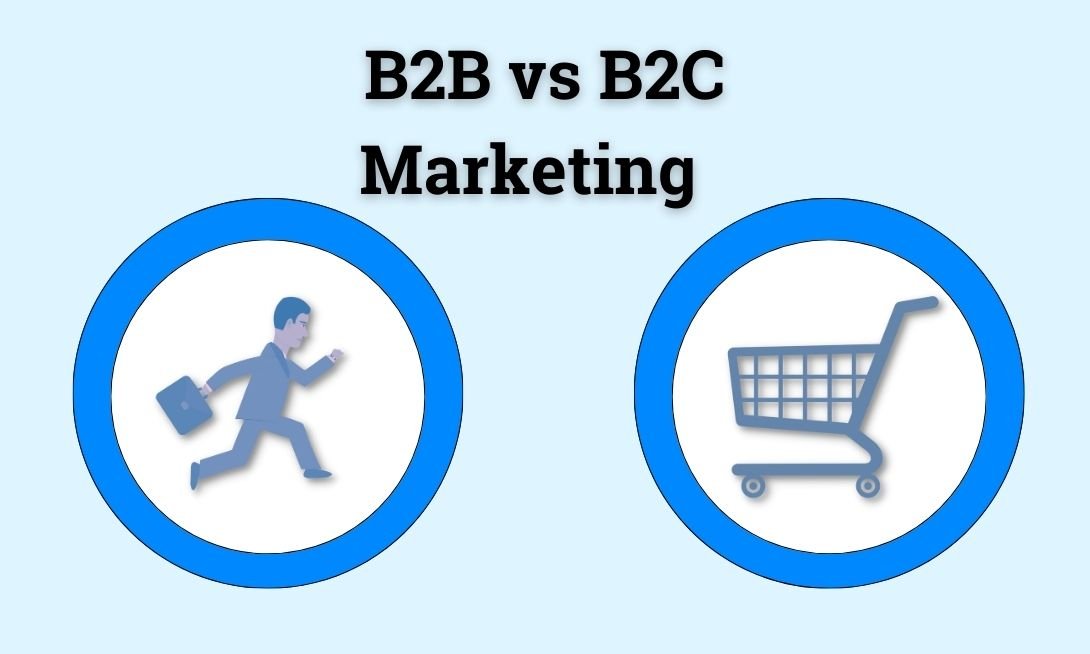In this article, we will compare B2B (business-to-business) and B2C (business-to-consumer) marketing. B2B marketing involves businesses selling products or services to other businesses, while B2C marketing involves businesses selling products or services directly to consumers. B2C businesses often prioritize customer satisfaction, while B2B businesses may focus more on generating revenue. In North America, the average B2C business has a customer base that is roughly 20% individual consumers and 80% businesses. You’ll explore B2B vs B2C marketing & all related aspects.
Table of Contents
This article will explore the concepts of B2B and B2C marketing in the digital space. We will define each type of marketing and discuss their respective purposes within the realm of digital marketing. Additionally, we will compare and contrast B2B vs B2C marketing, highlighting the key differences and similarities between these two approaches. By the end of this article, you will have a better understanding of how B2B and B2C marketing differ in terms of their target audiences, goals, and marketing strategies.
What is B2B Marketing?
Business-to-business (B2B) means companies engaging in commerce over a wide geographical area. B2B marketing is about selling to another company. However, you should know that B2B often attributes its difference to the complexity in which the business transaction operates.
B2B has always been about the commercial relationship between two companies. In digital marketing, B2B is about further expanding the transaction from one company to several other companies.
Related: The Importance of Online Marketing for Business Growth in 2023
What is B2C Marketing?
Business-to-consumer (B2C) is the sale of a product or service from one firm to a customer or potential customer. B2C marketing is about finding and analyzing customers online to determine what products and services they need. The company then supplies them with those goods & services.
B2C has always been about providing a satisfying product that gets customers to make purchases from a business. In digital marketing, B2C is no different. The assumption is that marketing to individual consumers is easier than marketing to larger corporations.
What is the Purpose of B2B and B2C in Digital Marketing?
The purpose of B2B in digital marketing is to use digital platforms to reach a broader business audience. B2B marketing is a way for brands to promote brand awareness by expanding their online presence. It’s often seen as an extension of traditional marketing.

Social media platforms present a great opportunity for businesses to reach consumers in different ways and be more visible with different forms of communication. In B2B marketing, the business needs to inform people of the benefits they give to potential consumers and customers.
The purpose of B2C in digital marketing is to help current customers and potential consumers understand the benefits they receive through a brand. B2C marketing aims to maintain the relationship between a company and its customers. This includes online and offline customer interactions.
In B2C marketing, customers can connect with the business through email, direct mail, and postcards. This connection allows companies to implement strategies to promote their goods and services to individual consumers.
Related: How to Make Money Using Web Marketing Strategies in 2023?
B2B vs B2C marketing – What are the Differences?
There are several differences between both the strategies.
Here are 10 major differences between B2B and B2C:
1. ROI is More Important in B2B than in B2C
When making purchases, businesses want a return on their investment. Perks such as value-added, cost savings, and efficiency are more crucial in B2B than in B2C.
B2C marketing is more on the emotional spectrum because consumers are believed to be seeking short-term gratification.
B2B marketing should focus more on convincing businesses to higher ROIs.
2. Long Chain of Command in B2B Purchases
Because a purchase is made for the business, it has to go through various departments for final approval. This can cause the sales process to take a lot longer relative to a B2C purchase. With B2C purchases, consumers can decide immediately if they want the product and buy it.
As Business purchases go through various people and departments before their final approval in B2B. Therefore, your B2B marketing campaign isn’t only targeting one person. It has to be appealing to everyone involved in the approval process.
In B2B marketing, if you have a deadline for a sale to be finalized, start the marketing campaign early.
3. B2B Contracts are Usually Long-Term
Relationships and contracts with B2B businesses are more long-term. This is because they want the supply chain to have reliability and stability. Businesses look for stability because of the ease it provides. They plan for the long or the immediate future.
Once-off purchases do exist in B2B companies. However, they are usually not big commitments. Long-term contracts with organizations of B2B type make it easier to predict and control the outcomes of the organizations.
In the long run, this makes it easier for the supply chain to control the market and make profits from them.
4. Avoid Industry Jargon in B2C
With B2C marketing, consumers aren’t interested in technical terminology. They are looking for products that will solve their problems. Keep the marketing tactics and phrases as simple as possible. It resonates more with consumers when they can easily understand the communicated content.
Using industry jargon in B2C rather than focusing on how it will benefit the customer is a wasted marketing campaign. It doesn’t mean that your company is bad. However, provide clear and actionable information for customers without waiting for them to be educated about technical details.
Industry jargon is more suitable for B2B buyers. They will resonate more with the technical terms than others will. B2B customers pay more attention to professional terms and phrases. B2C customers will focus on the quality of the product, its features, and how it satisfies their needs.
5. Sales in B2C are Emotionally-Driven
Sales in B2C are a lot more on the emotional spectrum whereas sales in B2B are more practical. Because consumers are more focused on buying a product for short-term pleasure, B2C marketing uses tactics like the fear of missing out (FOMO) to entice consumers to purchase products.
B2B sales rarely see impulse purchases. This is because businesses focus on long-term commitment and reward.
B2C sales strategies are based on competitors’ products, beliefs, and customer needs. B2B marketing has to be more rational and appeal to the mind.
6. Marketing in B2C Must Be Attention-Grabbing
Although marketing campaigns should appeal to B2B companies too, B2C marketing has to stand out to consumers and entice them. Because businesses don’t make impulse purchases, they give themselves more time to search for substitute suppliers.
However, consumers tend to buy because they are captivated by an ad. They like what they see, and they want it ASAP! So, B2C marketers have to incorporate flashy titles, use color psychology, and appeal to the desire of consumers.
7. Buying Cycle in B2B is Longer
The buying cycle in B2B companies is much longer. This is because buyers from a company spend a lot more time assessing a product before making a purchase. This is why it’s essential to be on a company’s radar in B2B if you want to have success winning their business.
It’s also the reason why there is more time allotted during a sale in B2B than in B2C. With B2C however, consumers make purchasing decisions a lot quicker. They compare solutions to a problem and then buy. In B2B, you are competing with other companies and their buying decisions.
Buyers will have more time to decide which product will provide them the most value for their time and money invested.
8. Target Demographic is Broader in B2C
B2B marketers usually have a specific audience that they want to market the product to. In B2C marketing, there is a larger audience to target.

Marketers aren’t limited to focusing on a specific business. So, in B2C marketing you should always target platforms that have a wider reach for more traffic. These platforms include billboards, television, blogs, and social media.
B2C marketers interact with customers by what they post, via private messaging, or feedback left on their site. When marketing in B2C, the length of the campaign could be shorter. But there is room for paid advertising and paid search tools.
B2B marketers identify the users that have specific needs then the marketers focus on creating a solution for those needs.
9. B2C Consumers Don’t Always Look for Long-Term Relationships
B2C marketers know that consumers are looking to satisfy their desires immediately. As such, consumers aren’t interested in building long-term relationships. They tend to look for whoever can provide them with an immediate solution.
B2C marketers also know that long-term relationships are hard to build and keep between businesses and consumers. This is the opposite of B2B marketing.
10. B2B Sales Offer Negotiable Prices
Fast-moving consumer goods (FMCG) have fixed prices and usually, these are non-negotiable. In B2B sales, however, prices are negotiable. This is because companies want a long-term contract with the business they are selling to. Negotiable prices mean a longer relationship.
In B2C marketing, customers tend to pay the price that’s been advertised. If they pay less, it’s an emphatic win for them. Business purchases look to be frequent for longer periods. Having flexible prices is crucial. These may not always be displayed outright.
Also read: Free Guide to Create a Funnel Marketing Strategy
B2B vs B2C marketing – What are the Similarities?
Here are 4 major similarities between B2B and B2C:
1. Both types of marketing rely on effective communication
Whether you are marketing to businesses or consumers, it is important to clearly and effectively communicate the benefits and value of your product or service.
2. Both types of marketing involve building relationships
In B2B marketing, building long-term relationships with clients is crucial, while in B2C marketing, building trust and loyalty with individual customers can lead to repeat business.
3. Both types of marketing can use a variety of marketing channels
Both B2B and B2C marketing can utilize a range of marketing channels, including social media, email, content marketing, and advertising.
4. Both types of marketing require market research
Understanding your target audience and their needs and preferences is important in both B2B and B2C marketing. Conducting market research can help you tailor your marketing efforts and increase their effectiveness.
Related: Top 5 Email Marketing Software to Improve Your Marketing Campaign for 2023
Conclusion
It should be noted that digital marketing, B2B and B2C have certain similarities and differences. They are all developing at a fast pace. B2B and B2C have a lot to offer to digital marketers. So, it’s important to be familiar with both the markets.
Also, in the business-to-business field, you can usually find more income potential than you can in the business-to-consumer space. There are a lot of things to consider when getting into digital marketing in the B2B and B2C spaces. This article tries to explain B2B vs B2C marketing with all the possible examples, hope that help you in marketing.
[article_faq]





